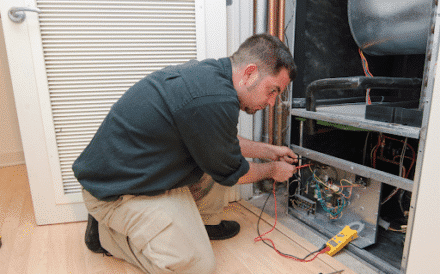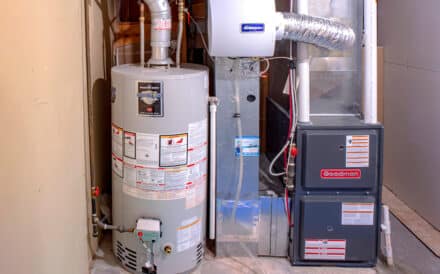Furnace Replacement 101: Choosing the Right System for Your Home
Is your furnace beginning to show signs of aging? Whether you’re dealing with rising energy bills, uneven heating, or a system that’s simply reached the end of its lifespan, the thought of residential furnace replacement may feel a bit overwhelming. From high-efficiency models to different sizes and fuel types, the market is teeming with options to choose from. That’s why we’ve put together this guide to walk you through everything from efficiency ratings to space requirements to help you pick the right system for your home.
Determine Your Fuel Type
While staying with your current fuel type is usually the easiest option, a residential furnace replacement can also be the perfect time to switch to a more efficient fuel source—provided your home can support the change. Let’s explore your fuel options, which include electricity, natural gas, oil, and propane.
Electric
These systems are fairly easy to install and maintain. While the purchase price is lower than other residential furnace replacement options, they can have higher operating costs because they run solely on electricity—similar to how a space heater works, but on a larger scale. Many homeowners are drawn to electric furnaces because they don’t produce carbon monoxide, so they’re safer from both a health and environmental perspective.
Gas
Gas furnaces work by warming air through a heat exchanger to deliver more powerful and cost-effective heating for homes with access to gas lines. While they come with a higher upfront cost and require annual flue maintenance, their lower operating costs and quick heating capability make them a popular choice for homeowners who live near or already have a natural gas line.
As the most popular heating option, gas furnaces come in 3 different models:
- Single-Stage Furnaces: These basic models operate like an on/off switch—they run at full power whenever they’re heating. While they’re more affordable and work well in mild climates, they typically offer lower efficiency ratings around 80% AFUE.
- Two-Stage Furnaces: These furnaces can operate at both full and reduced power for better efficiency. By working with your thermostat to alternate between high and low settings, they provide more consistent temperatures throughout your home.
- Modulating Furnaces: As the most accurate option on the market, modulating furnaces can make tiny adjustments to their heat output. This precise control means more consistent comfort, higher efficiency, and excellent performance in colder regions where heating demands vary throughout the day.
Oil
Oil furnaces are similar to natural gas furnaces. They create heat by atomizing oil and igniting it in a combustion chamber, delivering heat that warms air quickly and efficiently. While less common in modern homes, they’re still a viable option for homes that already have an on-site oil storage tank.
Propane
Propane systems operate similarly to natural gas furnaces except they can use a direct vent on an exterior wall rather than a flue, meaning you won’t need annual flue inspections and cleanings. Propane furnaces are also more fuel efficient, producing the same warmth as natural gas furnaces while burning less fuel.
Compatibility with Your Current System
Understanding your current HVAC setup is a key piece of navigating residential furnace replacement. Some homes have a combined system where one unit handles both heating and cooling, while others have separate systems for each function. Your replacement project is the perfect time to decide whether to maintain your existing configuration or switch to a different setup that better fits your space and preferences.
Consider Energy Efficiency
Energy efficiency should be at the top of your list of considerations for residential furnace replacement. This is measured using the Annual Fuel Utilization Efficiency (AFUE) rating. Thanks to federal regulations, all new furnaces must display their AFUE ratings to help consumers like you make informed decisions. The higher the AFUE rating, the more efficiently your furnace turns fuel into heat, helping you save on monthly energy costs. While high-efficiency furnaces tend to come with a higher price tag, they are a smart option that can deliver long-term cost savings. Aim to look for furnaces with the “Energy Star” label and an AFUE rating of 90 or higher, as this will ensure your system meets or exceeds federal efficiency standards.
Find the Right Size
Size can make all the difference when it comes to residential furnace replacement. If it’s too small, it won’t have the capacity to properly warm your home on those chilly winter days. If it’s too large, you’ll consume unnecessary energy and get hit with higher energy bills. While square footage is important, there are several factors that can impact the ideal furnace size for your space, including ceiling height, insulation levels, number of rooms and windows, and your home’s orientation. An experienced HVAC technician will be able to analyze all these factors and perform a load calculation to identify the right furnace size for your home.
Make the Right Choice with Silver State
From energy efficiency and fuel type to system compatibility and home size, choosing the right furnace for your home means weighing multiple factors. At Silver State, our experienced HVAC technicians are here to help you navigate your residential furnace replacement with ease and confidence. We’ll assess your specific needs and consider everything from your local climate to your monthly energy goals to recommend the perfect heating solution for your home.
Whether you’re looking to upgrade to a high-efficiency system or need guidance on the best furnace type for your space, our team provides reliable, expert advice and quality installation services to fit any budget. Ready to take the next step? Contact us today to get started.




